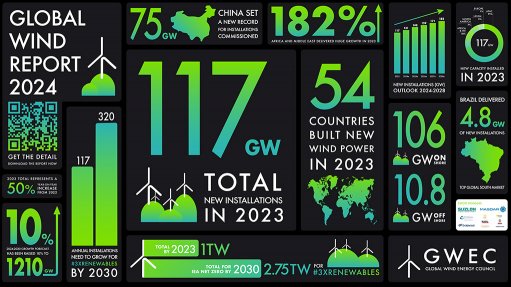Particulate matter pollution problematic in some cities – DEA
Particulate matter pollution remains a problem in major cities and industrial zones in Gauteng, Mpumalanga and KwaZulu-Natal. The most populated and industrial areas are consistently above the Air Quality Act standards for particulate matter and significantly above new air-quality standards set to come into effect in 2015.
Further, the Johannesburg air-quality monitoring system had not been functioning since 2012, leaving a gap in the data of Gauteng’s largest metro, said Department of Environmental Affairs national air-quality officer Dr Thuli Mdluli at an air-quality media briefing last month.
However, in 2013, Tshwane, Mpumalanga and the Vaal Triangle, including Vereeniging, Vanderbijlpark and Sasolburg, had particulate matter of 10 µm, called PM 10, at concentrations above the limit of 50 µg/m3, which also suggest a similar case in Johannesburg, despite the lack of data.
The Vaal Triangle and the Highveld Priority area, including Ekurhuleni, Middelburg and eMalahleni (Witbank), show consistent problems with particulate matter pollution and had particulate matter of 2.5 µm, or PM 2.5, at concentrations above the limit of 25 µg/m3.
While many industrial areas had sulphur dioxide (S02) concentrations close to or above the national limit of 19 parts per billion (ppb) prior to 2009, the S02 concentrations have decreased to below this legal limit in these areas, but have remained high in Vereeniging, eMalahleni, Sasolburg, Pietermaritzburg and Estcourt, while only eMalahleni consistently breaches the 19 ppb S02 limit.
Existing industrial plants must comply with existing plant standards by April 1, 2015, unless they are granted a compliance postponement; they must also comply with new plant standards by April 1, 2020, according to Section 21 of the Air Quality Act. New plants have to comply with new plant emissions standards immediately.
However, any postponements granted may be reviewed, should ambient air-quality conditions in the affected area of the plant not conform to ambient air-quality standards.
The main air-pollution sources in the worst-affected areas include dust and gaseous emissions from mining operations and mine dumps, industrial emissions from various industrial complexes, vehicle tailpipe emissions and the domestic burning of dirty fuels.
Responses will require concerted government effort to encourage the use of clean fuels; implement emissions testing, dust-control standards, alternative-energy sources and public transport; and improve municipal control over industrial emissions and localised pollution sources such as sugar cane burning.
Municipalities must establish air-quality management plans to identify all air pollution sources, develop baseline reports and set air-quality management objectives, as well as monitor and report against these objectives.
The Air Quality Act standards aim to give effect to the constitutionally guaranteed right of people to a healthy environment.
The new regulations will also impact on small-scale emitters, such as small boilers, temporary asphalt plants, and char and charcoal plants that have been declared controlled emitters in terms of the Act. The South African Bureau of Standards is providing standards for these small-scale emitters to meet the regulatory requirements.
Comments
Press Office
Announcements
What's On
Subscribe to improve your user experience...
Option 1 (equivalent of R125 a month):
Receive a weekly copy of Creamer Media's Engineering News & Mining Weekly magazine
(print copy for those in South Africa and e-magazine for those outside of South Africa)
Receive daily email newsletters
Access to full search results
Access archive of magazine back copies
Access to Projects in Progress
Access to ONE Research Report of your choice in PDF format
Option 2 (equivalent of R375 a month):
All benefits from Option 1
PLUS
Access to Creamer Media's Research Channel Africa for ALL Research Reports, in PDF format, on various industrial and mining sectors
including Electricity; Water; Energy Transition; Hydrogen; Roads, Rail and Ports; Coal; Gold; Platinum; Battery Metals; etc.
Already a subscriber?
Forgotten your password?
Receive weekly copy of Creamer Media's Engineering News & Mining Weekly magazine (print copy for those in South Africa and e-magazine for those outside of South Africa)
➕
Recieve daily email newsletters
➕
Access to full search results
➕
Access archive of magazine back copies
➕
Access to Projects in Progress
➕
Access to ONE Research Report of your choice in PDF format
RESEARCH CHANNEL AFRICA
R4500 (equivalent of R375 a month)
SUBSCRIBEAll benefits from Option 1
➕
Access to Creamer Media's Research Channel Africa for ALL Research Reports on various industrial and mining sectors, in PDF format, including on:
Electricity
➕
Water
➕
Energy Transition
➕
Hydrogen
➕
Roads, Rail and Ports
➕
Coal
➕
Gold
➕
Platinum
➕
Battery Metals
➕
etc.
Receive all benefits from Option 1 or Option 2 delivered to numerous people at your company
➕
Multiple User names and Passwords for simultaneous log-ins
➕
Intranet integration access to all in your organisation

















